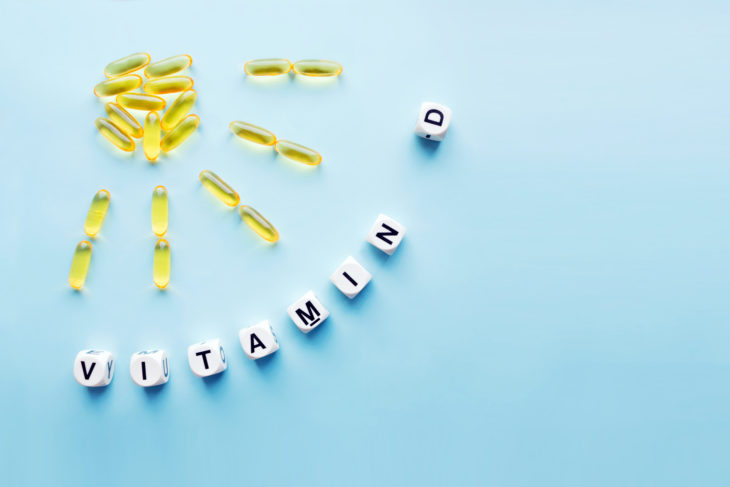We all know that vitamins and minerals are vital to your health. You probably also know that you need to take certain steps to make sure you’re getting enough of certain vitamins and minerals, usually through your diet. For example, you should eat more fresh fruit and vegetables, particularly citrus fruits, in order to boost your vitamin C. But what about vitamin D?
You’ve probably heard of vitamin D and know that it’s important. However, few people realise the importance of this vitamin or the problems associated with vitamin D deficiency. Let’s learn more about vitamin D, and most importantly, how we can make sure we are getting the right levels of vitamin D to promote great health.
Contents
What is Vitamin D and Where Do We Find It?

Source: greatlakesledger
The first thing you should know is that vitamin D isn’t actually a vitamin at all: it’s a hormone. This hormone is manufactured in our skin using cholesterol from our diet, combined with exposure to sunlight. This process generates pre-vitamin D3, which is transported to the liver and the kidneys, where it becomes the active form of vitamin D. In this form, vitamin D can be used by our bodies to support important bodily processes and promote overall good health. Vitamin D is also found in a limited number of foods, and, of course, in vitamin D supplements.
Vitamin D and General Health

Source: selfhacked
Vitamin D performs a number of important functions in the human body. Firstly, it maintains the proper balance between calcium and phosphate in the blood. This balance is essential for maintaining healthy bones, contracting muscles, and the proper functioning of the nervous system and indeed all the cells in our body. Without vitamin D, the body cannot absorb calcium and this is detrimental to bone growth.
Vitamin D deficiency has been linked to a number of conditions, including:
- Rickets, osteomalacia (misshapen bones) and other bone conditions
- Breast cancer
- Colon cancer
- Prostate cancer
- Heart disease
- Depression
- Weight gain
On the other hand, high levels of vitamin D have been linked to lower rates of disease, as well as being believed to assist in preventing or treating a range of conditions such as autoimmune disease, osteoporosis, cancer, chronic pain, diabetes, heart disease, and depression.
Vitamin D and Pregnancy

Source: news.yahoo
According to Premier Formulas, Vitamin D is also critical during pregnancy, being an essential nutrient that is vital to the health of both the mother and the baby. It is believed that vitamin D can cross the placenta during pregnancy, at the same time converting into an active form that the baby can use to support their health and growth. It is thought the placenta contains special vitamin D receptors and enzymes for this process.
Vitamin D is also an area of concern which should be closely monitored, as figures show that between 20 and 40 % of all pregnant women are vitamin D deficient. Vitamin deficiency during pregnancy has been linked to a large number of bone and skeletal issues in newborns, including rickets, fractures and skeletal homeostasis, a condition were bones form incorrectly. Low vitamin D levels can also lead to low birth weight, preterm birth, affect motor and social development as children grow, and increased chance of respiratory issues. For the mother, a lack of vitamin D has also been linked to increased infections, inflammation, gestational diabetes, and changes to birth outcomes, such as increased rate of c-sections.
How to Treat Vitamin D Deficiency

Source: nps.org
Vitamin D deficiency can occur due to inadequate exposure to sunlight, inefficient vitamin D production in the skin, or a lack of vitamin D in the diet. Certain health problems such as gastrointestinal disorders, renal diseases, and liver diseases can also cause vitamin D levels to go awry. There are a number of signs and symptoms of vitamin D deficiency, including skeletal malformations, muscle weakness or bone pain, depression and cognition issues, fatigue, and generally getting sick often.
Those who suspect they may be deficient in vitamin D should seek medical advice. Generally, vitamin D deficiency is confirmed using a simple blood test. If found to be deficient, the doctor will likely prescribe a course of treatment involving dietary changes, sun exposure or supplements, or perhaps some combination of these. Recently, there has been a serious debate among scientists how much Vitamin D is necessary for our body to function normally. It turns out that the numbers were higher than expected. It is important to say that normal levels range between 50-100 micrograms per deciliter but it depends on the person and their blood type whether it will be towards one end of the specter or the other. Therefore, you should definitely check how much your body requires before you start with the intake.
Foods with Vitamin D

Source: familydoctor
Eating foods that contain vitamin D2, such as fatty fish, mushrooms, egg yolk, and fortified foods, can help to boost the body’s vitamin D levels. Your doctor will tell you how much sun exposure is appropriate, but usually, at least 10-15 minutes, 2 to 3 times per week during non-winter months is recommended. Finally, taking vitamin D supplements may be prescribed as the most efficient way of supplying vitamin D to the body.
The food which is mentioned here is definitely beneficial for some other processes in your body as they come full of proteins and other vitamins. Regulating your diet is a big part of the Vitamin D intake and you shouldn’t neglect this aspect.
Conclusion
Hopefully, we’ve managed to give you information about Vitamin D, how it works, what the deficiency means and how you can deal with it. Now that you have a general idea, it is time you take some steps. Lastly, we would advise consulting your doctor anytime you have any doubts and before you even start dealing with the issue.
